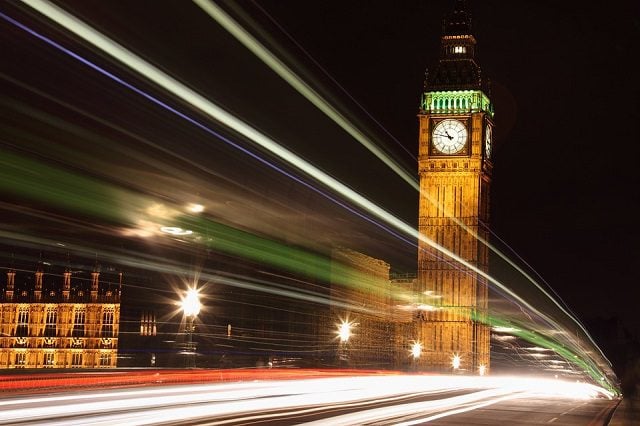
Bus rushes by Big Ben in London [Pixabay / CC0 public domain]
***
This exchange is from my Facebook page, with a Catholic. His words will be in blue.
*****
Change. The present hierarchy just wants to change something, anything. The craving for change, for making a unique mark, is behind most Vatican decisions. It’s getting old. And predictable.
What do you mean by “change”? Consistent developments or corruptions and false doctrines / heresies (evolution of dogma)?
Heresy aside, change in general. The simple attitude to change something. To make a mark.
It makes a huge difference what kind of change it is. Consistent development is good and fine. Evolution of dogma is heresy. So which is it?
Of course it does. Newman is my hero and I understand his development of doctrine well. My point is that there is a certain desire to change for the sake of changing something, anything that can be changed without contradicting dogma. I’m not even claiming that anything in particular is heretical but simply a particular attitude to change something is present in the hierarchy. Such an attitude breeds confusion. What we are witnessing is that confusion.
That’s still avoiding the essential issue. If it is consistent development, it’s good. Jesus developed all kinds of things very rapidly. It was part of the reason people thought He was crazy and why He was killed.
St. Paul rapidly developed the relationship of law and grace, old and new covenants. That was hugely — exponentially — more of a change and more “confusing” than anything this pope has done.
Cardinal Newman himself (as you must know if he is your hero – as he is mine) was massively misunderstood for over forty years. It only subsided (and then not totally) after he became a Cardinal in 1879.
He was falsely regarded as a liberal and proponent of evolution of dogma, and not trusted. When he became a Cardinal this is what he talked about. And he continues to be massively misunderstood by anti-Catholics and even some Catholics today, who distort his true teachings.
Lots of that going on with the Holy Father, too, as I have to constantly document and chronicle, as an apologist.
Just because it’s licit to change something does not mean that it should be changed. If said change causes confusion then it is best not to change it. For example, Ad orientem or extraordinary ministers (now ordinary) are harmful to the faithful yet such innovations do not contradict dogma. You’ve stated that any change that does not contradict dogma is good. I think that is where we fundamentally disagree. Dogma does not develop in a void but in a environment. To strip dogma of that environment is dangerous and confusion.
I didn’t say that “any change that does not contradict dogma is good.” I said “Consistent development is good and fine.”
And St. Paul was teaching directly about dogma, the deposit of faith. I’m not speaking of the deposit.
That helps make my argument for me all the more, because if even important doctrines and dogmas in the deposit of faith could be so rapidly developed, causing massive confusion and spinning of heads, then certainly non-dogmatic things can be developed rapidly, by the principle of “if the greater thing can change, so (plausibly and consistently) the lesser, by the same token . .
So what has the Holy Father changed that you don’t like?
St. Paul certainly developed doctrine: the transition from the old covenant to the new: emphasis on law to the emphasis and primacy of grace. And that’s because Christian beliefs didn’t start from scratch. They are developments from Judaism.
Jesus followed pharisaical customs; Paul called himself a Pharisee twice. Jesus even told His disciples to follow pharisaical teaching; just not the example of their hypocrisy. Paul and other Jewish Christians still attended temple and synagogue services.
This is why your contention that change is such a bad thing doesn’t fly, because by analogy it would implicate Paul and Jesus far more than Pope Francis: even if he were in office for 50 years.
Think of the massive changes that Christianity brought! The Trinity, the expansion of the kingdom of God and community of God to the Gentiles, the abrogation of all the dietary laws . . .
Man, if the reactionary types and pope bashers had been around then, they would never have become Christian. Peter (Pope #1) would have been a pariah because he said all foods were clean! This is massive, huge change.
The first Christian council eliminated the necessity of circumcision (the very initiation rite) for Gentile converts.
And you’re worried about stuff that Pope Francis does? What are these huge and constant changes you don’t care for? How about a long list of them, since you think they’re so ubiquitous?
There is a significant difference between the deposit of faith given to the apostles and the subsequent development in the post apostolic era. The New Testament is part of the deposit, not its development.
*
I would contend that these are all trumped-up tempests in a teapot. I don’t have to link to stuff. Each one of my articles and those by colleagues like Scott Eric Alt that have defended the Holy Father show that each charge is a bum rap and an unjust one.
Each one has to be argued on its own merits. But it’s the easiest thing in the world to just throw a bunch of manure, because it is known that some will always stick. That’s what we have seen with the papal critics. They keep throwing and throwing, despite being systematically contradicted and refuted every time.
So now you come around and object to all this “change” when in fact very little actual change has occurred, because that is the “narrative” that has been created by all this constant nonsense. Lots of supposed, alleged, conspiratorial-type proposed changes. Very little in fact . . .
This current deaconess thing is nothing. He simply said he would be open to a commission to study a thing that was present earlier in Church history. He didn’t take a stand (nor did I in my two posts). His position is rather status quo.
What was the last big “controversy”? Oh, Amoris Laetitia. The critics were soiling themselves day and night (lots of diaper changes), and in the end nothing had changed whatsoever regarding communion, as Cardinals Müller and Schönborn have quite sufficiently clarified.
It was much ado about nothing. And except for a possible handful of things that are not readily explained or understood, that’s how all these silly things are.
He hasn’t changed regarding contraception. Amoris Laetitia itself had very strong remarks against that. He didn’t give Lutherans communion. He wasn’t even there. Someone else did, and it has since been admitted to be a big mistake.
As for celebrating the “Reformation”, that’s a huge discussion, but we can celebrate good things in it; we need not celebrate that which we disagree with. Jesus commended a pagan centurion for his faith, for heaven’s sake. Paul noted the religiosity of the pagan Athenians and commanded us to honor all men, including the pagan Roman emperor. Being diplomatic or conciliatory as much as possible is not necessarily compromise. But this is the usual traditionalist antipathy and profound misunderstanding of legitimate and authentic ecumenism, which is not indifferentism.
So even your dinky little reluctantly provided list has nothing to it, once it is analyzed for five minutes.
The method of papal critics is so much like anti-Catholic methodology, where the non-Catholic will throw out a list of 100 abominable things about the Catholic Church. Of course each one has to be discussed or argued, but the mere list has the appearance of great strength. So many things, after all! How could such a system with that many errors possibly be true???!!
*****
Meta Description: My opponent stated: “The present hierarchy just wants to change something, anything. … craving for change, … It’s getting old.”
Meta Keywords: Pope Francis, development of doctrine, innovation, corruption, Cardinal Newman, evolution of dogma, change for its own sake, anti-traditionalism, theological liberalism













